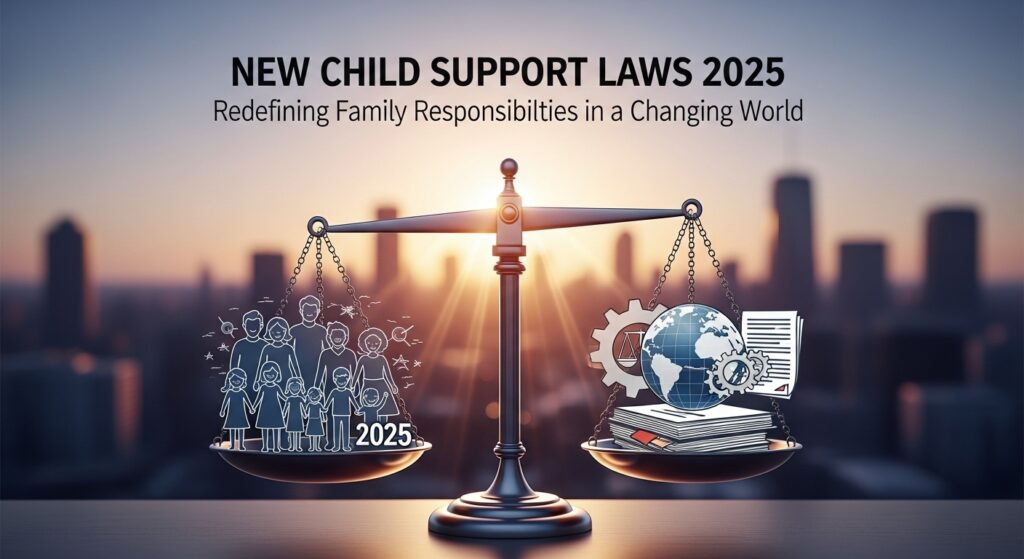In today’s rapidly evolving society, laws surrounding family, children, and parental responsibility must adapt to meet modern realities. Financial stability, equitable caregiving, and the best interests of the child remain central, yet how these are defined continues to change. The new child support laws 2025 represent an important step forward, redefining how governments, courts, and parents balance responsibility, fairness, and accountability.
This article explores the significance of the changes, what they mean for families, and why they signal a new era in child welfare and parental responsibility.
What Are the New Child Support Laws 2025?
The new child support laws 2025 are a set of updated legal frameworks that govern how financial and caregiving responsibilities are shared between parents after separation or divorce. While specifics vary across jurisdictions, the overall goals are clear:
-
Ensuring adequate financial support for children regardless of parental conflicts.
-
Modernizing calculation methods to reflect today’s income structures, including gig work and self-employment.
-
Recognizing shared custody arrangements, adjusting obligations to ensure fairness when both parents contribute significantly.
-
Promoting enforcement mechanisms to reduce unpaid obligations and secure children’s well-being.
These updates reflect the growing recognition that child support laws cannot remain static—they must evolve alongside social, economic, and cultural changes.
A Philosophy Rooted in Child-Centered Justice
At the heart of the new child support laws 2025 is a philosophy of child-centered justice. The reforms emphasize:
-
Equity: Ensuring both parents contribute proportionally based on actual income and caregiving roles.
-
Transparency: Simplifying formulas and clarifying obligations to reduce conflict.
-
Flexibility: Accounting for diverse family arrangements, from blended families to joint custody agreements.
This approach reflects a broader shift: the recognition that law is not only about legal obligations but about nurturing the long-term well-being of children.
Bridging Financial Support and Emotional Responsibility
One of the most noteworthy aspects of the new child support laws 2025 is how they attempt to balance financial responsibility with caregiving roles. Historically, child support was primarily seen as a monetary obligation, often creating friction between parents. The reforms broaden this definition by recognizing:
-
Shared Parenting Time: Adjusting payments when caregiving duties are balanced between parents.
-
Non-Monetary Contributions: Considering the value of time, education, and caregiving labor in child-rearing.
-
Community Resources: Encouraging collaboration with schools, healthcare providers, and social services to meet children’s needs holistically.
This signals a paradigm shift—acknowledging that raising children is both a financial and emotional responsibility.
Influence of Technology in Child Support Systems
The digital age plays a major role in the new child support laws 2025. Governments and courts are increasingly leveraging technology to streamline the process and reduce disputes. Innovations include:
-
Online Portals: Allowing parents to calculate, manage, and track payments transparently.
-
Automated Withholding: Ensuring timely payments by linking obligations directly with payroll systems.
-
Digital Evidence Submission: Enabling parents to provide documentation of income, expenses, or caregiving responsibilities more efficiently.
By embracing technology, the system becomes less adversarial and more transparent—helping both parents focus on the child’s welfare rather than administrative battles.
A Model for the Next Generation of Families
The new child support laws 2025 reflect broader shifts in family dynamics and generational values. Younger generations—Millennials and Gen Z—are redefining parenting roles, with more emphasis on equality, shared responsibility, and balance between work and caregiving.
Key takeaways include:
-
Authenticity and Fairness: Families expect laws that reflect real-world parenting, not outdated stereotypes.
-
Diversity and Inclusion: Recognizing varied family structures, including unmarried parents, blended households, and same-sex couples.
-
Global Awareness: Aligning domestic child support policies with international standards and human rights frameworks.
These principles demonstrate that child support laws are no longer just financial formulas—they are tools for creating equity and opportunity in children’s lives.
Challenges and Opportunities
Like any reform, the new child support laws 2025 face both challenges and opportunities.
Challenges:
-
Resistance to Change: Traditional stakeholders may resist new formulas and digital systems.
-
Complex Family Structures: Blended families and non-traditional arrangements complicate standardized support models.
-
Enforcement Across Borders: For families split across states or countries, collection remains difficult.
Opportunities:
-
Reducing Litigation: Clearer formulas and online systems minimize courtroom battles.
-
Encouraging Collaboration: Parents may find more equitable solutions when obligations reflect actual caregiving.
-
Strengthening Child Welfare: Consistent, timely support improves long-term health, education, and emotional outcomes for children.
These opportunities highlight how reforms can turn obstacles into catalysts for progress.
Why the New Child Support Laws 2025 Matter
The importance of these reforms lies in their recognition that children’s needs evolve alongside society. Rising living costs, flexible work patterns, and changing family roles demand a legal system that is both responsive and fair.
The new child support laws 2025 matter because they:
-
Prioritize children’s rights over parental disputes.
-
Reflect today’s diverse realities of income, family, and caregiving.
-
Build trust in legal systems by offering clarity, fairness, and enforceability.
Ultimately, these laws help ensure that no child is left unsupported due to outdated legal structures or administrative inefficiencies.
Looking Ahead
As societies continue to change, child support laws will likely remain in constant evolution. The new child support laws 2025 mark an important step forward, signaling a future where fairness, transparency, and child-centered justice guide parental responsibilities.
Looking ahead, the challenge will be balancing flexibility with consistency—ensuring laws adapt without creating confusion. Yet the trajectory is clear: child support will increasingly be about empowering families, protecting children, and fostering responsibility that goes beyond money.
In a world where families are diverse, economies are shifting, and children’s rights are paramount, these reforms set a new standard. They affirm a simple but powerful truth: supporting children is not only a legal duty but a social responsibility, shared by parents, communities, and institutions alike.






